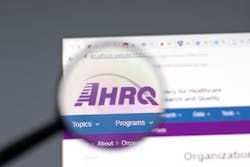The federal Agency for Healthcare Research and Quality (AHRQ) has announced a challenge competition to explore the feasibility, resources and infrastructure needed to integrate real-world data from healthcare systems into its systematic review findings.
AHRQ’s Evidence-based Practice Center (EPC) Program produces systematic reviews that synthesize information from the peer-reviewed literature and provide the state of the science on available healthcare technologies as well as healthcare delivery strategies.
The process of creating these reviews is stakeholder-driven, methodologically rigorous, and transparent, according to AHRQ. Reviews are used to inform healthcare decisions, including recommendations in clinical practice guidelines as well as national coverage determinations by Medicare. AHRQ also supports healthcare systems in their efforts to improve the quality of care and optimize patient outcomes; systematic reviews are scoped to address issues of priority to healthcare systems. Yet due to limitations in the literature base, AHRQ says that EPC systematic reviews may be inconclusive or only represent a narrow patient population, making it difficult to generalize or implement the findings within heterogeneous healthcare systems.
Systematic reviews may also lack contextual details that can inform successful implementation. Improving healthcare delivery (and thus patient outcomes) often entails addressing issues beyond the benefits or harms of an intervention, traditionally the objective of a systematic review. Traditional reviews may not explain gaps in uptake or use of a clinical service and questions about how best to implement a given clinical service.
A recent EPC Program methods report articulated specific scenarios with examples of where healthcare system data may most effectively complement systematic reviews. In one example, investigators at the Mayo Clinic found that published evidence on outcomes following total pancreatectomy was sparse, so they supplemented a meta-analysis of published studies with their own unpublished healthcare system data, which more than doubled the sample size and improved the strength of evidence available. In another instance, secondary analyses of Veterans Affairs (VA) data confirmed the applicability to the VA of findings from a published systematic review
The recent EPC methods report also outlines important limitations and considerations when using unpublished healthcare system data alongside systematic reviews, such as relevant limitations in data quality. However, the report did not address the necessary resources, skills, partnerships, and processes required to use healthcare system data alongside systematic reviews to strengthen the actionability of systematic reviews.
This Challenge, therefore, invites applicants to conduct analyses of healthcare system data to supplement an existing AHRQ EPC Program systematic review. This will help AHRQ understand if and how sources of data and information outside of traditional systematic reviews, particularly from healthcare systems themselves, could be used alongside systematic reviews to improve decision making, healthcare delivery, and potentially patient outcomes.
The AHRQ EPC Program is interested in learning how analysis of real-world data collected by healthcare systems can be used in conjunction with findings from an AHRQ systematic review to inform healthcare decision-making in the context of a specific local setting.
The goal of this challenge is to explore and determine the feasibility, resources, and infrastructure needed to incorporate unpublished healthcare system data into systematic review findings. Ideally, these data will enable the healthcare system to make decisions about which practices to incorporate locally and how to overcome barriers to implement the evidence to improve clinical practice, healthcare system operations and, potentially, health outcomes.
AHRQ is hosting this challenge as a two-phase competition. All costs associated with developing and submitting proposals as well as conducting the analysis of real-world data will be the responsibility of the Challenge participant. Cash prizes will be awarded only after the projects are evaluated and determined acceptable at the end of Phase 2.


